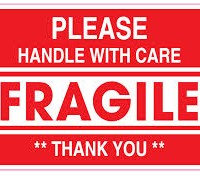On the Concept of Fragility

I’ll admit it… I am a news junkie. I’m not sure where my attraction to random facts and stories comes from but I suppose that part of it is that I just like to know what going on in other places besides the immediate area that I live in.
Technology and the Internet has gone a long way to feeding this addiction. I have, over the years collected a set of links to various blogs and publications that I read on a regular basis. This list is always being re-invented and re-ordered as my interests change and is always accessible to me on all my devices in a nice concise form using an application called Netvibes.
Part of the benefits of my digital wandering is that I sometimes run across fascinating concepts and ideas that can (or should) be adopted and applied to situations other than the situation where I first found them.
The concept of “fragility” that I read about in this article is one of those gems. Although the writer applies the concept of fragility to politics, the concept can be applied to organizations (e.g corporations) and my personal life.
Simply put, fragility is aversion to disorder. Things that are fragile do not like variability, volatility, stress, chaos, and random events, which cause them to either gain little or suffer. A teacup, for example, will not benefit from any form of shock. It wants peace and predictability, something that is not possible in the long run, which is why time is an enemy to the fragile.
I’m thinking that an aversion to disorder is not all a bad thing but, like many things it has its limits. In some cases, having an aversion to disorder causes stress which in turn causes growth and change. That’s not always a bad thing. It’s how “disorder averse” I chose to be.
Entropy is a measure of disorder; the higher the entropy the greater the disorder
I believe that disorder will always exist in the world I live in (read about the subject of entropy if you don’t believe this) and in fact each day, a huge amount my my personal energy is spent combating entropy and disorder (as an IT professional and Information Architect, I work in an environment that, by definition, is focused on taking disordered information and trying to turn it into ordered knowledge). Some of that disorder is the way that the world was created and some (most) of it is our own doing when we try to fight against the way that things were originally created.
Sometimes, I’ll accept this disorder as the “natural order of things”. I’ll reason that no matter how much energy and time I invest in a situation, I’m willing to accept how fragile something is. Sometimes, I’m just plain lazy, I am totally willing to accept disorder and I decide that no amount of energy will restore any level of order.
Sometimes, however my aversion to fragility (as measured by my personal entropy meter) moves into the red zone. It’s in this red zone where I am willing to invest my time, talents and resources into combating disorder.
I’ve written here previously about justice as putting the world back to the way it was when God created it. I don’t think that I ever quite came to a conclusion as to what exactly is the fuel that drives us toward justice. Perhaps ones fragility has a lot to do with it.
Things to think about.